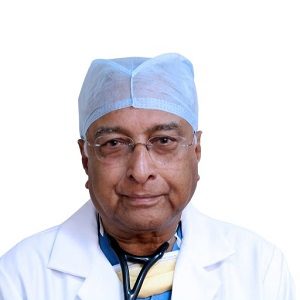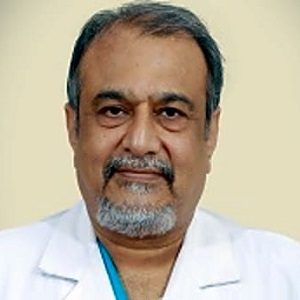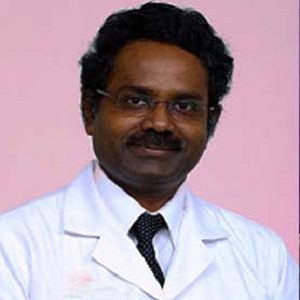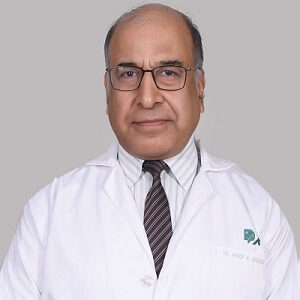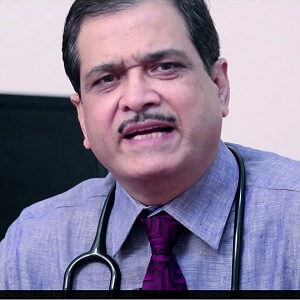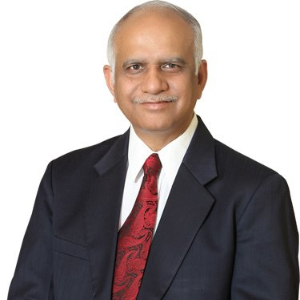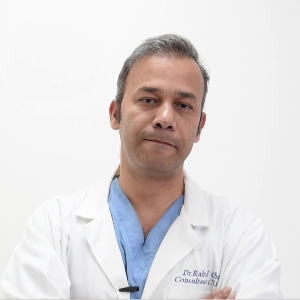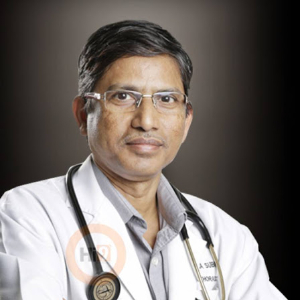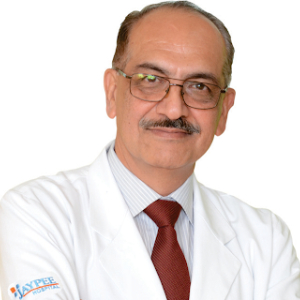Best Doctors for Aortic Aneurysm Surgery in India
- Cardiac Surgeon, Cardiothoracic Surgeon, Vascular Surgeon; Chennai, India
- Over 45 years’ experience
- Apollo Hospitals Greams Road
Profile Highlights:
- Padma Bhushan awardee Dr. Girinath M R is a senior cardio-thoracic Surgeon in Chennai having experience of more than 45 years in Cardiac Surgery.
- Dr. M R Girinath was a fellow of Coronary Artery Surgery and Congenital Heart Surgery at the University of Wisconsin, USA.
- He provides consultation and diagnostic services for Mitral/Heart Valve Replacement, Cardiac Pacing, Invasive Cardiology, ABPM, Balloon Mitral Valvuloplasty, CT Angiography, etc.
- Cardiac Surgeon, Cardiothoracic Surgeon, Vascular Surgeon; Chennai, India
- Over 37 years’ experience
- Apollo Hospitals Greams Road
Profile Highlights:
- LF Sridhar is a well-known Cardiothoracic & Vascular Surgeon in Chennai, now working at Apollo Hospital in Greams Road, Chennai, and has an experience of 37 years in this arena.
- Some of the services available with the doctor are Mitral/Heart Valve Replacement, Cardiac Pacing, and Intra – Arterial Thrombolysis, Pacemaker Implantation, and bypass surgery besides the regular OPD procedures.
- Cardiac Surgeon, Cardiothoracic Surgeon, Vascular Surgeon, Chennai, India
- Over 25 years’ experience
- Apollo Hospitals Greams Road
Profile Highlights:
- Dr. K Madhan Kumar is a well-known Cardiac Surgeon in Tamil Nadu, having many years of experience in the domain.
- His experience came from practice and teaching. These days, he is associated with Apollo Hospital Greams Road in Chennai as a Senior Consultant Cardiothoracic & Transplant Surgeon.
- Dr. Kumar has also completed Fellowships in Cardiothoracic Surgery at SGH in London as well as ECMO, VAD, and transplantation at HH in London.
- Top Cardio Thoracic & Vascular Surgeon | Apollo Hospital, New Delhi, India
- 37+ Years Experience
- Indraprastha Apollo Hospital, New Delhi
Profile Highlights:
- Dr. Bhaba Nanda Das is a distinguished Cardiothoracic and Vascular Surgeon with over 37 years of experience, currently practicing at Apollo Hospitals Indraprastha in New Delhi.
- Holding advanced degrees in MBBS, MS, and MCh, Dr. Das is renowned for his expertise in managing a broad spectrum of cardiothoracic and vascular conditions.
- His clinical proficiency spans the treatment of complex issues such as Aortic Valve Disease, Atrial Fibrillation, Coronary Artery Disease, and Myocarditis.
- Top Cardiothoracic Surgeon and Vascular Surgeon | Apollo Hospital, New Delhi, India
- 42+ Years Experience
- Indraprastha Apollo Hospital, New Delhi
Profile Highlights:
- Dr. Anoop K Ganjoo is one of the best cardiologists & cardiothoracic surgeons in India with a total experience of 42 years.
- Dr. Ganjoo has a rich experience of over two decades in several complicated procedures, like Mitral valve repair and replacement, Peripheral and Coronary angiography & angioplasty, vascular surgery, ICD, diffuse coronary artery disease, Pacemaker, Radiofrequency ablation of arrhythmias, adult Cardiothoracic Surgery, CRT implantation, Balloon valvuloplasty, and PDA device closure.
- Top Interventional Cardiologist | Apollo Hospital, New Delhi, India
- 26+ Years Experience
- Indraprastha Apollo Hospital, New Delhi
Profile Highlights:
- Dr. Rajeev Kumar Rajput is one of the best Cardiologists in India with nearly 23 years of experience. He is a clinical cardiologist engaged in diagnosing and treating cardiovascular diseases.
- Dr. Rajput is currently working as a senior consultant with Indraprastha Apollo Hospitals, New Delhi, and also offers patient care at the Heart & Gynae Clinic.
- Dr. Rajeev Kumar Rajput specializes in Angiography and Interventional Cardiology. The treatments provided involve Neonatal and Infant cardiac surgeries, Device Closure, and Valve replacement. He has expertise in Aortic Aneurysm Surgery, Vascular Surgery, Percutaneous Coronary Interventions, Endovascular Repair, Cardiac Catheterisation, Open Heart Surgery, and MV replacement.
- Dr. Rajput is credited with publishing several papers in noted medical journals.
- Top Cardiac Surgeon | Max Hospital, Saket, New Delhi, India
- 37+ Years Experience
- Max Super Specialty Hospital, Saket, New Delhi
Profile Highlights:
- Dr. S K Sinha currently serves as the Senior Director of CTVS at Max Super Speciality Hospital, Saket, a role he has held since April 2018.
- With over 37 years of dedicated experience in cardiac surgery, Dr. Subhash Kumar Sinha is a distinguished leader in the field of Cardiac Sciences.
- ducationally, Dr. Sinha’s credentials are impressive. He earned his MBBS from Armed Forces Medical College, Pune, followed by a Masters of Surgery from Patna Medical College and an M.Ch. in CTVS from the Post Graduate Institute of Medical Education and Research, Chandigarh.
- Senior Cardiothoracic and Heart Lung Transplant Surgeon, New Delhi, India
- Over 23 years’ experience
- PSRI Hospital
Profile Highlights:
- Dr. Rahul Chandola is a renowned cardiothoracic and vascular surgeon in India specializing in Adult CTVS along with heart and lung transplant surgeries.
- He is an expert heart and lung transplant surgeon and has performed over 100 heart transplant surgeries with successful results in both adult and pediatric patients.
- Currently, he works as a Senior Cardiothoracic and Heart Lung Transplant Surgeon in PSRI Hospital, New Delhi.
- Cardiothoracic & Vascular Surgeon, Hyderabad, India
- Over 30 years’ experience
- CARE Hospitals Hyderabad
Profile Highlights:
- Dr. G Rama Subramanyam is a well-known cardiothoracic and vascular surgeon who specializes in open-heart surgery and has performed more than 5000 such procedures since 1997.
- He is also an expert in Minimally Invasive Coronary Artery Bypass Grafting and heart valve surgeries that includes over 200 Ischemic mitral valve repair surgeries and 100 myxomatous and Rheumatic mitral valve repair surgeries.
- Cardiac Surgeon, Noida, India
- Over 30 years’ experience
- Jaypee Hospital, Noida
Profile Highlights:
- Dr. Manoj Luthra is a highly experienced and renowned Cardiac surgeon who has 30+ years of experience and performed the first heart transplantation surgery in the Indian Armed Forces.
- Till date, Dr. Manoj Luthra has performed more than 12,000 cardiac surgeries including 8000 heart bypass surgeries. He has also performed many heart transplants and aneurysm surgeries.
Best Hospitals for Aortic Aneurysm Surgery in India
Abdominal Aortic Aneurysm (AAA)
Abdominal Aortic Aneurysm (AAA) is the inflammation or swelling of the aorta which is the largest artery of the body. Large aneurysms are rare but are fatal if they burst. It runs from the heart to the abdomen through the chest and is the largest vessel in the human body. A rupture of the AAA can cause bleeding that may be life-threatening.
Types of Abdominal Aortic Aneurysm
The size and the speed of growth of an Aneurysm are the key factors for the classification.
- Small (<5.5 cm): These are slow-growing Abdominal Aortic Aneurysms with a comparatively lesser risk of rupturing than the larger aneurysms. Regular abdominal ultrasounds are often helpful in monitoring these aneurysms.
- Large (>5.5 cm): These are fast-growing Abdominal Aortic Aneurysms that have high chances of rupturing. There might be internal bleeding due to rupture followed by other major complications. The larger the size of the aneurysm, the higher the chances of treating the same through the surgery.
Symptoms of Abdominal Aortic Aneurysm
In most cases, a small abdominal aortic aneurysm shows no symptoms. However, a larger AAA may cause pain or a pulsating feeling in the abdomen & persistent back pain. As it grows slowly without showing any visible symptoms, it is often difficult to detect an Abdominal Aortic Aneurysm. While some aneurysms stay small without any rupture, many others grow large.
They may notice a few symptoms if they have an Abdominal Aortic Aneurysm that continues to enlarge. These symptoms may include back pain, deep and persistent pain in the abdomen, and a pulsating feel near the belly button. It also includes clammy skin, nausea, shock, and vomiting.
A ruptured abdominal aortic aneurysm may cause:
- Dizziness
- Sweaty skin
- Rapid heartbeat
- Shortness of breath
- Loss of consciousness
Causes & risk factors of Abdominal Aortic Aneurysm
- Age: Increasing age is a risk factor for abdominal aortic aneurysms.
- Gender: AAAs are most common in men aged over 65.
- Smoking: Tobacco contains substances that damage the aortic wall.
- Atherosclerosis: In atherosclerosis, there is the narrowing of the arteries due to the accumulation of plaque. These plaques cause the widening of the aorta so that the blood keeps on flowing leading to the weakening of the aorta.
- High blood pressure: It increases the pressure on aortic walls. This may weaken the walls of the aorta and cause damage to the same.
- Family history: Having a family history of AAA may increase the risk of developing it.
- Infection in the aorta: A fungal or bacterial infection may cause an Abdominal Aortic Aneurysm.
- Blood vessel diseases: Some diseases may cause inflammation in the blood vessels.
- Trauma: An injury or trauma may also cause an Abdominal Aortic Aneurysm.
Risk factors for Abdominal Aortic Aneurysm
- Family history: If you have a family history of an Abdominal Aortic Aneurysm, you are at an increased risk of developing the condition.
- Tobacco use: Tobacco consumption can increase your chances of developing an Abdominal Aortic Aneurysm.
- Color complexion: People with white or fair color complexion have a risk of developing abdominal aortic aneurysms.
- Other types of aneurysm: If you have an aneurysm in some other blood vessel, it may increase your risk for Abdominal Aortic Aneurysm.
Diagnosis of Abdominal Aortic Aneurysm
Routine physical examination
Abdominal MRI
Ultrasound
Abdominal CT scan
Treatment options for Abdominal Aortic Aneurysm
Medical monitoring
Treatment of Large AAA
Endovascular surgery
During endovascular surgery, a small incision is made in the groin through which a graft made of metal mesh is inserted & advanced to the swollen aorta. This graft is sealed to the aortic wall at both ends which reduces the risk of bursting.
Open surgery
Treatment of small or medium AAA
For a small (3.0-4.4cm) or medium (4.5-5.4cm) aneurysm, surgery may not be recommended as it may not benefit the patient. The patient is called for regular check-ups (every year in case of a small aneurysm and every three months in case of a medium aneurysm) & scans to monitor the size of the aneurysm.
The patient is advised to prevent the aneurysm from getting bigger, which is done by:
- Stopping smoking
- Eating a balanced diet
- Maintaining a healthy weight
- Regular exercise
Complications of Abdominal Aortic Aneurysm
A ruptured aneurysm or aortic dissection (or tear) in the layers of the Aortic wall are the major complications. The larger the size and speed of growth of the aneurysm, the higher are the chances of Aneurysm rupture which may cause bleeding, which is life-threatening.
You will realize a ruptured aneurysm if you have low blood pressure, sudden and continuous abdominal pain, or a faster pulse. A tearing sensation or back pain also signifies the rupture of an aneurysm.
Prevention Of Abdominal Aortic Aneurysm
There are various ways of preventing and worsening Abdominal Aortic Aneurysm. These, does not limit to but, may include:
- Quitting the consumption of tobacco and smoking may help prevent aneurysms.
- Maintain normal blood pressure and cholesterol by following the instructions of the doctor.
- Eating a healthy and balanced diet that includes fruits and vegetables is also helpful.
- Exercising regularly with the right activities advised by the doctor may also help prevent aneurysms.

